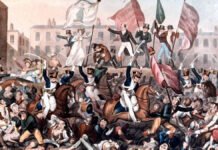The Autobiography of Malcolm X is the story Malcolm tells of his experiences and his growth. The first chapter begins in 1926 and chronicles the first eleven years of Malcolm’s life with his hard-working parents and seven siblings. The title of the chapter, Nightmare, conjures up a dark and foreboding image. It forewarns the reader that something evil is about to happen. It describes the Ku Klux Klan attack in Omaha, the burning of the family’s home in Lansing, the many fights of his parents and their harsh treatment of the children, the tragic murder of his father, the harassment of the family by welfare officials, Malcolm’s first brush with petty crime, the transfer of Malcolm to the custody of another family and the eventual break-up of the Little family when his mother is institutionalized. Malcolm rejected the surname Little as a slave name given to his family by white oppressors, and he became known as Malcolm X. He explains in his autobiography -“For me, my X replaced the white slavemaster name of Little which some blue-eyed devil named Little had imposed upon my paternal forebears.”
However, the narrative is arranged in a way that shows the nightmare of racist violence that pervaded Malcolm’s childhood from the moment of his birth. Indeed, in the first sentence, the narrator, Malcolm, gives a chilling description of ‘hooded Ku Klux Klan riders’ who ‘galloped up to our home in Omaha, Nebraska, one night’. That the Klan made their threats while Louise was pregnant with Malcolm makes it seem as though Malcolm was destined for a confrontation with white supremacy. His “earliest vivid memory” is of racists burning down his family’s house. Even his ancestry, in his light-skinned West Indian mother, carries the mark of racist violence–”that white rapist’s blood.”

Malcolm’s memories of his childhood are brutally honest. His father’s unwavering belief in the importance of self-reliance and his willingness to risk his life preaching revolutionary, back-to-Africa sermons had a profound influence on young Malcolm. In addition, he learns an important life lesson during his rabbit-hunting expedition with Mr Gohannas and his friends. Malcolm strategizes and shoots many more rabbits than his companions. He concludes, “Anytime you find someone more successful than you are, especially when you’re both engaged in the same business—you know they’re doing something that you aren’t.” Later on, Malcolm’s mother has a premonition about her husband’s impending murder, but she is powerless to prevent it. The final nightmare in the chapter occurs when, in Malcolm’s words, “our family was destroyed.” Here, Malcolm is distraught because his mother has been committed to a state mental hospital, and the Little family is separated.
Paradoxically, the style Malcolm uses to describe his childhood tragedies is straightforward and surprisingly dispassionate. This first chapter sets the mood and tone for the rest of the autobiography. The reader can presume that Malcolm’s innocent and carefree days have been lost forever. His inner conflict, the choice between leading a life of crime or following in the footsteps of his illustrious father, recurs throughout the book. Even before he has entered the world, Malcolm is already forced to confront the realities of racist violence and hatred. His mother’s example of bravery serves as a model for and foreshadows his future stances against racism.
In Earl Little, the reader gets a glimpse at the archetype after which Malcolm will unconsciously model himself. Malcolm will reflect his father’s activism and fervent religious belief in his life’s work and will follow him into an equally violent death—a tragic prediction on Malcolm’s part, and one that readers cannot help but see through the lens of his assassination (which occurred soon after the publication of his autobiography). The identity of his white grandfather serves as a kind of “original sin” for Malcolm. Of all his siblings, Malcolm is the lightest one, which will bring him certain privileges in life, but it will also haunt him – a visible, intrinsic reminder of the horrors of racism and violence.
By calling it a ‘nightmare night’, Malcolm underlines the psychological scarring left by this experience. And like nightmares, Malcolm will be forced to re-live this experience when, as an adult, his own family’s house is firebombed. The Black Legion gets its name because they wear black hoods, instead of the white hoods of the usual KKK. When the State, which is theoretically supposed to protect all citizens, fails to act, Earl takes their future literally into his own hands, a lesson for Malcolm in both self-reliance and the racism inherent to the American establishment. While Malcolm disapproves of his father’s colour bias, he also sympathizes with him. Earl cannot control this unconscious preference (the result of internalized racism) any more than Malcolm can control his skin colour.
Malcolm identifies the two traits he most admires in his father: his political activism and his strong masculinity. Not only should one engage in ‘serious’ and intellectual political meetings, Malcolm believes, but one also should be courageous and defiant towards threats. These features will underlie his position in the Nation years later. His mother, Louise appears to be a complex character, who on the one hand embodies the strict self-discipline Malcolm will later embrace in the Nation, but on the other hand, unreasonably beats her son for something out of his control. Malcolm, meanwhile, demonstrates a shrewdness that will serve him well throughout life.
One of the driving influences in Malcolm’s life is his ongoing relationship with race and racism in America. Malcolm’s journey starts from a passive acceptance of the effects of racism around him; he then begins to gain and strongly emphasize self-respect for all black men, before ultimately coming to believe in the potential for brotherhood between all men. Malcolm’s religious journey is marked by a continuous struggle to find a faith in which he can believe and flourish both spiritually and intellectually. As with his views on race and racism, Malcolm’s views on religion play a key role throughout his life, but also evolve as his understanding and experience change and broadens. Even though Malcolm’s father was a Christian minister, Malcolm never felt at home in Christianity. As a child, he simply finds it hard to believe in Christianity. As he puts it, “Even at that young age, I just couldn’t believe in the Christian concept of Jesus as someone divine.”

The concept of family, which often extends beyond biological ties, plays a very important role in Malcolm X’s life. Unfortunately, this idea of a family often serves to leave Malcolm even more alone than he was before, rather than acting as a bulwark against life’s challenges. Malcolm grows up in a fairly large family and was itself subject to the racist forces of society. The powerful, racist and unmerciful forces of society arrayed against his family, which soon tore it apart. First, Malcolm’s father is murdered, and then his mother is regularly harassed by government officials until she is finally declared insane and sent to a mental institution. The kids, meanwhile, are sent to live with different families in the area. “The Welfare, the courts, and their doctor gave us the one-two-three punch.” Malcolm never forgave the white authorities for the torments his mother went through. He felt that she had been the victim of forces beyond her control, of a white bureaucracy that treated its black subjects as things to be controlled rather than as people to be helped. Her attempts to salvage her pride by fighting back had resulted only in the disintegration of her family and the collapse of her mental stability.
Many of Malcolm’s later ideas and attitudes are foreshadowed in this chapter, as are most of the major themes of the book. His father’s involvement with Garvey’s Universal Negro Improvement Association anticipates Malcolm’s later militancy, and his father’s attitudes toward Africa prepare the way for Malcolm’s “internationalism” and “Pan-Africanism” in the last year of his life. Mrs Little’s taboos about food anticipate the dietary restrictions of the Black Muslims and orthodox Islam. The hypocritical snooping of the welfare officials illustrates Malcolm’s charges of the “institutional racism” of American society; the encounters with these officials anticipate Malcolm’s later confrontation with white authority, first as a criminal, then as a political figure.





























